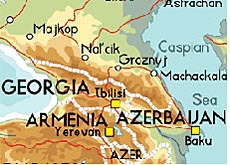
Swiss set up disaster relief centre in Georgia

Switzerland has sent a team of experts to the Georgian capital, Tbilisi, to help set up a rescue centre in one of the world’s most earthquake-prone regions.
The base will also eventually serve as a centre for disaster relief operations in other Caucasian states.
The Swiss Agency for Development and Cooperation (SDC) is funding the project to the tune of SFr690,000 ($502,000).
“Georgia desperately requires trained rescue personnel and good equipment,” David Tchtinadze, who is working on the project, told swissinfo.
Tchtinadze added that the country’s capability to conduct earthquake rescue operations had suffered during the post-Soviet era.
Before the collapse of the Soviet Union, operations were handled by the army, but since then private organisations had been forced to take up the slack.
“Nobody took any responsibility for this work after the end of the communist state,” he said.
A small earthquake last year highlighted the current dearth of resources.
Nobody was able to measure the strength of the tremor because power failed at the recording station, and bad communications meant rescuers had to rely on television news to get their bearings.
Special training
The Swiss aid project will focus at first on setting up the centre for operations in Georgia, before extending its reach to the entire southern Caucasus region.
“Eventually, we hope its work will extend to Armenia and Azerbaijan as well,” said Walter Fust, head of the SDC.
Swiss Rescue, which brings together a variety of organisations for missions abroad under the auspices of the SDC, is to be used as a model, especially for cooperation between rescuers, the police and fire brigade.
“The overall goal is to improve the search and rescue capacities of the Georgian government,” said Markus Baechler, who is overseeing the project.
He told swissinfo the base would also deal with mountain rescues and recovering the bodies of the victims of drowning.
The first phase of the project – the construction of a building to house the rescue unit – has already been completed.
Two-thirds of the Swiss funding package was spent on the building, with rest going on equipment and clothing.
24-hour cover
The centre, which was opened on Friday, has enough room for 25 rescuers to stay on duty 24 hours a day. There are also theory and training rooms, as well as storage space.
Technical material includes special rescue equipment and communications gear, as well as four four-wheel drive vehicles and a truck.
Georgian instructors are also being trained as part of a cooperation deal signed in 2002 between the SDC and the country’s interior ministry.
“These local instructors will then be able to train other people,” said Fust.
The project took longer to set up than originally planned, but Fust says that cooperating with the Georgians hasn’t proved difficult.
“It wasn’t people who slowed down the process, but rather bureaucratic red tape,” he told swissinfo.
The SDC has agreed to organise courses given by members of Swiss Rescue and the Swiss Humanitarian Aid Unit. The Swiss defence ministry is responsible for developing the project and implementing it.
More than earthquakes
Since independence in 1991, Georgia has endured periods of civil war and unrest, as well as violence related to the separatist forces in the breakaway regions of Abkhazia and South Ossetia.
These conflicts led many people to flee the region in the early 1990s and become refugees.
Tensions in the region have not eased off despite efforts by the United Nations to broker peace.
Switzerland handed over SFr2.6 million in humanitarian aid last year for the victims of the Abkhazia conflict, aimed mostly at helping families that have been split up, as well as elderly and destitute people.
The SDC, which is running 19 projects in the county, has also lent its support to a programme aimed at improving farming families’ incomes.
Switzerland has also had a special diplomatic presence in Georgia since July 2002.
Heidi Tagliavini is the United Nations special envoy in Tbilisi, where she is trying to negotiate a peaceful and political solution to the Abkhazia conflict.
swissinfo, Jean-Michel Berthoud (translation: Scott Capper)
Switzerland has supplied humanitarian aid to the three southern Caucasian republics, Georgia, Armenia and Azerbaijan since the early 1990s.
The SDC opened a regional coordination office in Tblisi in 1996.
Other offices were opened later in the Azeri capital, Baku, and the Armenian capital Erevan.
Since 1999, Swiss aid has totalled SFr6.9 million for the region.
The SDC coordination bureau concentrates on sustainable use of natural resources, good governance, disaster preparation and prevention, as well as humanitarian aid where needed.

In compliance with the JTI standards
More: SWI swissinfo.ch certified by the Journalism Trust Initiative



























You can find an overview of ongoing debates with our journalists here . Please join us!
If you want to start a conversation about a topic raised in this article or want to report factual errors, email us at english@swissinfo.ch.